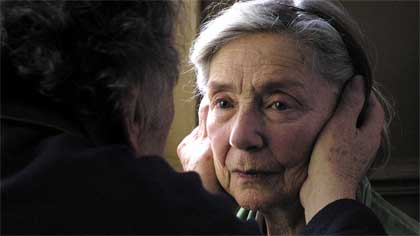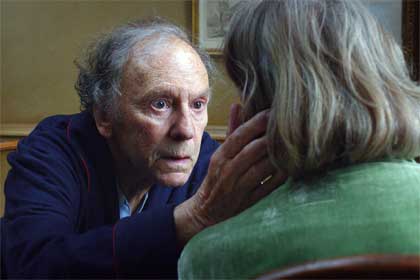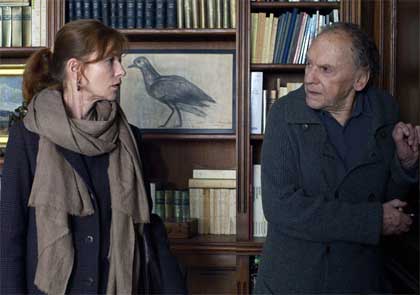Film (2012)
Written and directed by Michael Haneke
Kendall Square Cinema
Cambridge, MA
Cinematography: Darius Khondji, Film Editing: Nadine Muse, Monika Willi
With Jean-Louis Trintignant (Georges), Emmanuelle Riva (Anne), Isabelle Huppert (Eva), Alexandre Tharaud (Alexandre), Ramón Agirre (Concierge’s Husband)

Emmanuelle Riva as Anne
in “Amour”
Courtesy Sony Pictures Classics
Georges (Jean-Louis Trintignant) and Anne (Emmanuelle Riva) are retired musicians in their eighties living in an apartment in Paris. Anne suffers health challenges, which forces the couple into new and greater levels of isolation. Their daughter, Eva (Isabelle Huppert), also a musician, pays visits when not on tour, adding to the emotional complexity.
In some ways this film is a perspicacious presentation of the dilemmas of aging. It presents an uncompromising portrait of the dire challenges of incapacity for the one who suffers it, and the associated burdens imposed upon the partner.
Slowing the pace of the presentation to that of the action itself makes this life seem endless and almost unendurable.
There is much to be taken from this film. The way in which the aged couple’s changing perception of the active world is vividly displayed, surfacing in their reactions to news, to music, to their daughter’s and son-in-law’s visit, or to a note sent by a young piano student.
Director Haneke has provided thoroughgoing closeups of the two principal actors, and one gets, through his lens, a sense of their great beauty as well as of their decrepitude. The mixture of those portraits is striking.
Emmanuelle Riva’s Anne, in particular, shimmers with a kind of fragile grace while she buckles in decline. And when she must exhibit the frustrations of that decline, she does it with heartbreaking effectiveness.

Emmanuelle Riva as Anne
in “Amour”
Courtesy Sony Pictures Classics
Jean-Louis Trintignant’s Georges shows a mixture of tenderness and deep frustration. The constantly dazed look in his eyes and the crumpled shuffle of his walk complete the picture of love, devotion, resignation and despair.
Despite conveying quite effectively the tragic trajectory of this couple, the film is very mannered and tedious.
Its expanses are extremely broad and its time so attenuated that the film literally seems to go on forever. There is some dialogue, but not a great deal, and very little music. There is certainly no score to speak of. There are brief snatches of music when Anne and Georges briefly sit down at the piano, when Georges listens to a recording, or when a piano student comes to visit; there is music, but not much and not for long.
The result of this great attenuation is an effect which, in part, communicates the intent of the film, an experiential sense of what it is like to be old and infirm. The monotony and frustration of this more or less unmediated expanse is a function of the director’s insistence on overusing this particular technique throughout. A bit of rhythm, alleviation, even humor, might have gone a long way to transforming a long, monotonic treatment into a poetic one.
When there were moments of drama, they struck me as not quite right, more jarring and inconsistent with the characters and the tone than useful punctuations of them.

Jean-Louis Trintignant as Georges
in “Amour”
Courtesy Sony Pictures Classics
Isabelle Huppert (Eva) is a fine actress, but the portrayal here is a bit over the top, too overemotional, to be persuasive.
I found myself more moved by the brief interactions Georges has with the concierge’s husband (Ramón Agirre) – simple, direct, heartfelt, evoking quite clearly a sense of compassion one must feel for an aged and infirm couple striving to manage on their own with dignity.
It would appear that the casting of Emmanuelle Riva and Jean-Louis Trintignant represents a cinematic inside joke by director Michael Haneke.
Riva starred in the classic, paradoxical film Hiroshima, Mon Amour (1959) by Alain Resnais, clearly a reference, if nothing else, by title. Jean-Louis Trintignant starred in Claude Lelouch’s A Man And A Woman (1966), a film in which the eponymous protagonists spend much of their time communicating wordlessly, a germane reference given the the subject-matter of Amour.
– BADMan
Leave a Reply